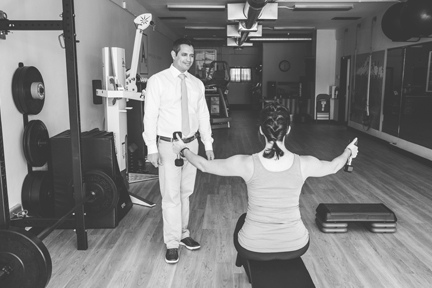See a Therapist Today to Prevent Tommorrow's Injury
 What if there was a way to know that you’ll develop chronic neck pain ten years from now? What if there was also a way to know that there’s something you could be doing now to stop it? No, you don’t need a crystal ball, but you do need a physical/occupational therapist.
What if there was a way to know that you’ll develop chronic neck pain ten years from now? What if there was also a way to know that there’s something you could be doing now to stop it? No, you don’t need a crystal ball, but you do need a physical/occupational therapist.
How you move is a great predictor of injuries and other dysfunctions to come, and no one is better trained to identify your risks than one of our therapists. With the assistance of evaluation tools that analyze your fundamental movements, we can get a clear picture of what the future will bring for you. Our professionals rely on a number of movement screens, including ones that require certification such as the Functional Movement Screen (FMSTM) and Selective Functional Movement Assessment (SFMATM).
According to research including Pre-Participation Screening: The Use of Fundamental Movements as an Assessment of Function—Part I, it’s valuable to see a physical therapist for a full evaluation and movement screen before beginning a new exercise program, to improve performance in activities you already engage in and to prevent injuries down the line. This injury prevention strategy is universally suitable, not just for athletes.
Our team at A2 Physical Therapy utilizes the FMS and SFMA for both our rehabilitation and athletic divisions. It is a good indicator of risk related to repetitive use injuries. The tests help us identify faulty movement strategies and corrective exercises.
The first appointment is critical: It allows our team to establish a baseline, or a way to measure changes—both good and bad—during future appointments. The best way to track those changes is by making a habit of scheduling annual visits with one of our licensed professionals, just as you do with your primary care physician. Remember that chronic neck pain we were talking about? Your therapist is trained to detect the earliest signs of neck dysfunction, address contributing factors, and prevent the problem from growing into a major issue.
The key to effective injury prevention is to return each year for a movement scan. With annual appointments, you’ll get the reassurance that you’re moving your body properly and doing everything you can to stay healthy for many years to come.
About The Private Practice Section of the American Physical Therapy Association
Founded in 1956, the Private Practice Section of the American Physical Therapy Association champions the success of physical therapist-owned businesses. Our members are leaders and innovators in the health care system. The American Physical Therapy Association (APTA) represents more than 85,000 physical therapists, physical therapist assistants and students of physical therapy nationwide. For more information, please visit www.ppsapta.org.
"Thanks so much - from the front desk, to my therapist Danny, to the owners. I felt supported by caring professionals while I recovered from my work related injuries. I felt encouraged to work hard to fully recover, and I feel like I have. Negotiating health care services can be overwhelming, but A2 made getting the care I needed straight forward. Thanks again for everything."
− David
"A2 has been a game changer for me. I’ve had back problems my entire life from high impact sports and now sitting at a desk for work. Dr. Antone’s wellness program has nearly eliminated my stiffness and soreness that use to bother me throughout the day. I’d highly recommend him and his team for turning your health around. Thank you A2!!"
− Tony
"I found A2 Physical therapy was able to give me the help I needed in the exercises and cupping they gave me to loosen up my stiff joints and muscles that I could hardly move due to surgery, stiffness, and soreness. I think A2 PT are running a top notch business. The therapists that worked with and on me were extremely courteous. Molly was so helpful in my therapy and an absolute delight to work with. She got me back to 100% in just 4 weeks and my visits were 1 day a week. This was my first experience working with PT’s and it was totally a wonderful experience. Thank you A2 Physical Therapy and thank you Ms. Molly Daugherty for working with me and making my recovery and stability improve so quickly. Should I need PT again I will call you. Again many thanks."
− Diane